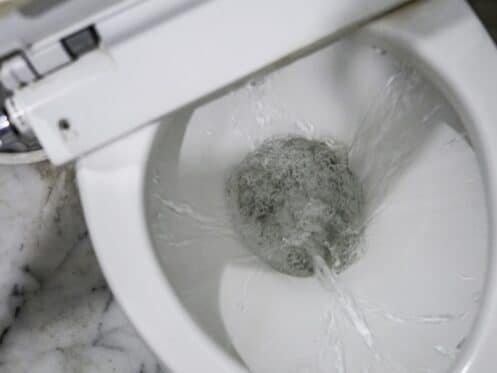Caring for the drains in your Bonita Springs, FL home certainly sounds like a dirty job. After all, with regular use, residential drains invariably develop thick, slimy coatings of soap scum, grease, hair, and other organic waste. However, the most important part of your ongoing drain maintenance is actually easy and hands-free. You simply need to limit what you send down these features. Among the most common causes of sewer line blockages, whole-house backups, and other costly plumbing issues are flushable wipes. Read on to find out why it’s never safe to send these products down your toilets.
Your Toilets Can Only Handle Rapidly Degrading Materials
Standard toilet paper has a very plumbing-friendly design. Although it holds up well during use, toilet paper rapidly degrades as soon as it’s fully submerged in water. Depending upon which brand you use, you might even see a sizable portion of this process before you flush.
Compare the ultra-rapid breakdown of toilet paper to the breakdown rate of a paper towel. If flushed, these thicker and more durable paper products can wreak havoc on plumbing systems. Not only are they significantly larger, but they’re also made with sturdier wood pulp fibers and additional adhesives.
Flushable wipes are even stronger still. Like paper towels, they have durable wood pulp as their base, but many options are further reinforced with petroleum-based polymers such as viscose. There are also many brands of flushable wipes that contain polypropylene, polyethylene, and other synthetic, man-made fibers to make them more robust.
For a visual demonstration of the major differences between these three “flushable” products, fill three glasses with lukewarm water and then add several sheets of toilet paper to one, a single paper towel to the another, and a flushable wipe to the last. Give each glass a vigorous stir and consider what you’re left with. You’ll likely find that the toilet paper has already partially dissolved, and both the paper towel and the flushable wipe are completely intact. If you wouldn’t send paper towels down your toilets for fear of a clog, you shouldn’t send flushable wipes down them either.
The Diameter of Pipe Interiors Shrinks Over Time
Arguments for using flushable wipes often center around the fact that these products are fairly small. If they can fit down toilets, they should be able to make their way through residential plumbing systems, clear sewer lines, and enter the municipal sewer main. In theory, this is true. Unfortunately, the interior of most residential plumbing systems is hardly pristine. Deposits of minerals and other hard water build-ups gradually shrink the diameter of pipes at their interior. Grease residues, human waste, and other trapped debris also contribute to this shrinkage. At certain points throughout your plumbing system, there may be insufficient room for even a single flushable wipe to pass. This is all the more true if you haven’t had your drains or sewer line professionally cleaned for quite some time.
For optimum and reliable functioning, wastewater lines rely heavily on the quick and total degradation of the solid and semi-solid materials that enter them. While standard toilet paper typically dissolves in one to four minutes, most flushable wipes can take three to eight weeks to disintegrate entirely.
“Flushable” Wipes Can Get Snagged on Countless Obstructions
When traveling through aging pipes, flushable wipes frequently get snagged on rough and uneven surfaces. Although a single snagged wipe might not have an immediate impact on how your plumbing system performs, it will over time. As additional waste passes through or flows over these partial obstructions, a good portion of debris is retained. This eventually creates a non-permeable barrier that prevents new wastewater from passing.
Fatbergs, Smallbergs, and Long-Term Plumbing and Sewer Problems
The attributes that make flushable wipes appealing to consumers are the very same qualities that make them detrimental to plumbing systems. People like these products because they’re highly effective in removing waste, skin oils, and other residues. When flushed, flushable wipes continue to attract and retain these things. Unfortunately, these wipes don’t distinguish between skin oils and the grease and rendered fats that enter plumbing systems by way of dirty dishes and appliances like dishwashers and washing machines. Worse still, as flushable wipes attract and absorb fatty waste, they become sticky, tacky, and more likely to adhere to one another.
In residential plumbing systems, this ongoing attraction and retention of waste results in the formation of hard, sizable obstructions known as smallbergs. In municipal sewer systems, smallbergs and free-floating flushable wipes frequently create massive obstructions known as fatbergs. Fatbergs can bring the movement of wastewater from every plumbing system in an entire neighborhood to a complete standstill. The largest fatberg on record is an 820-foot mass that’s currently on display at the Museum of London. It serves as visible evidence for why both plumbers and water treatment companies adamantly advise consumers against flushing these products.
These Products Can Compound Existing Sewer Problems
Hard water build-ups and accumulations of grease aren’t the biggest obstacles that flushable wipes encounter as they move through plumbing systems. The underground sewer line that travels from your home to the municipal sewer main is rife with moisture and high-nutrient materials that tree roots and weeds are attracted to. As pipes age and develop cracks and other structural imperfections, tree roots and weeds grow into them and take advantage of their contents.
You might have issues with aggressive tree roots and weeds if your toilets and drains make strange gurgling or bubbling sounds at night when no one is using your plumbing system. These sounds mean that slow-moving water in your sewer line is finally clearing an internal obstruction. Although some wastewater and semi-solid water can pass through fast-growing tree roots and weeds, everything will start backing up if there’s a greasy, sticky wad of flushable wipes blocking the way. Even though blockages caused by tree roots and weeds must be professionally cleared as soon as possible, using flushable wipes when these problems already exist can cause them to spiral out of control quickly. You’re more likely to end up with a whole-house backup if one or more people in your household regularly send flushable wipes down your toilets.
Common Arguments for Flushable Wipes
Despite frequent arguments about the safety of flushable wipes for plumbing systems, many consumers routinely stock up on these items and consider them an essential part of their self-care. Compared to rapidly degrading toilet paper, they remove more human waste and leave people feeling a lot cleaner and fresher. However, there are other effective ways to achieve these same results without risking costly clogs or backups.
Toilet paper sprays are an increasingly popular alternative to flushable wipes. These gentle, cleansing solutions are sprayed directly onto toilet paper to moisten it and increase the amount of debris it picks up. Consumers can enjoy the clean, fresh feeling of flushable wipes with a fast-degrading paper product that rushes through their pipes problem-free.
You also have the option of installing a bidet. You can upgrade your toilets to models with built-in bidets, or you can install your bidets as low-cost toilet attachments.
The Fundamentals of Good Drain Maintenance
There’s a lengthy list of items that you should avoid putting in your plumbing system. However, according to many plumbers, flushable wipes are always at the top of this list. Keeping them out of your toilets is important to your ongoing plumbing maintenance. To keep your drains smelling fresh and moving swiftly, you should also schedule professional drain cleaning once annually and professional sewer line cleaning every two to three years.
We proudly serve Bonita Springs, FL and the surrounding communities. We offer heating, cooling, plumbing, sewer, and drain services. We also provide slab leak repairs and well systems. If you’ve been using flushable wipes and are having sewer problems, we can help. Get in touch with Plumbing & Cooling Nerds today to schedule an appointment.

